Modern slavery is a major global problem, but it remains largely hidden. King’s research has helped policymakers to interpret and develop legislation that protects victims and holds the perpetrators of modern slavery accountable.
Modern slavery is a major global problem, but it remains largely hidden. King’s research has helped policymakers to interpret and develop legislation that protects victims and holds the perpetrators of modern slavery accountable.
Modern Slavery is an umbrella term covering a wide variety of circumstances where individuals are exploited for others’ gain. It exists in all parts of the world. While it has proven difficult to agree a common definition, in 2016 the International Labour Organization estimated that over 40 million people were victims of modern slavery. While media coverage often focuses on human trafficking, those seeking to address the problem of modern slavery also focus on slavery, servitude, forced or compulsory labour and child labour.
King’s College London research has sought to address modern slavery and human trafficking using three distinct approaches, focusing on shortcomings in the responses of a developed country (the UK), of a developing country (India) and in international law.
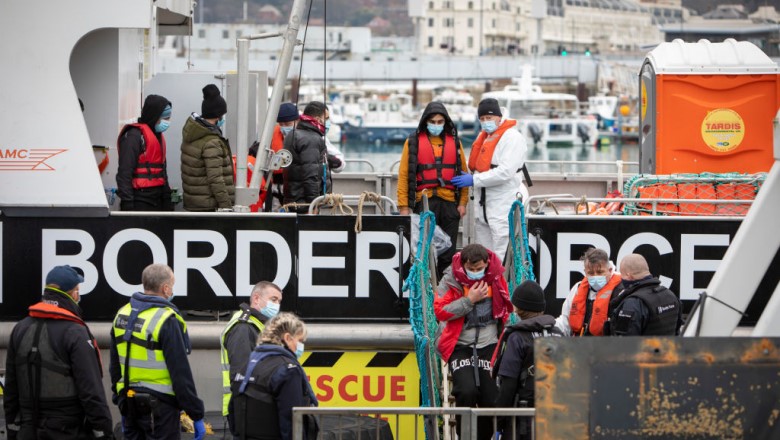
Dover, UK, December 2021: Men, women and children are brought ashore by UK Border Force before being taken to Tug Haven Processing Centre. UK Border Force detained those pictured after intercepting a small boat attempting to cross the Channel. (photo by Andrew Aitchison / In pictures via Getty Images)
Advancing a victim-centred approach
As a barrister, Professor Satvinder Juss had seen at first hand the English approach to human trafficking. He observed a “law enforcement” culture, focused on prosecuting alleged breaches of immigration controls, with little regard for the victims. The problem was not limited to the police or the Home Office: barristers and judges, Juss observed, were failing to recognise that victims might be eligible for asylum, with the system’s “stock response” of repatriation contributing instead to a vicious circle.
Once you have broken somebody's will and forced them into prostitution, they are easy game, because they're not going to put up the same resistance. When we return the victims of modern slavery to their countries of origin the traffickers know they have come back and they go for them again: they are simply re-trafficked.
Professor Satvinder Juss, Professor of Human Rights Law
Juss argued that the UK needed to adopt a victim-centred approach. He recommended a monitoring mechanism in supply chains and more secure visa status for domestic workers from overseas. He questioned whether the National Reporting Mechanism (NRM), the instrument used to identify potential victims and ensure they receive appropriate support , was sufficiently independent and to what extent its decision-making processes were influenced by elements of immigration control.
Juss also argued that in the UK the bar was being set too high for victims of human trafficking seeking asylum, and emphasised the importance of clearly defining concepts such as ‘consent’ – the deception at the heart of human trafficking, he argued, renders the idea of consent irrelevant.
In 2011, Professor Juss was invited to join the Centre for Social Justice (CSJ)’s Slavery Working Group, the only lawyer to be asked to do so. Over the following 18 months, he worked with prosecutors and activists to map the path ahead. The Group’s 2013 report, It Happens Here: Equipping the United Kingdom to Fight Modern Slavery, placed the problem of modern slavery centre stage.
Today many people assume slavery is a problem of the past or a crisis confined to foreign lands. They are wrong. As this report reveals, that tragic trade continues on its destructive path. And it happens here.
It Happens Here: Equipping the United Kingdom to Fight Modern Slavery, p5
The Group’s report, and the victim-centred approach Juss had advocated for, laid the foundations for the Modern Slavery Act 2015, a ground-breaking piece of legislation that has been replicated in a number of countries.
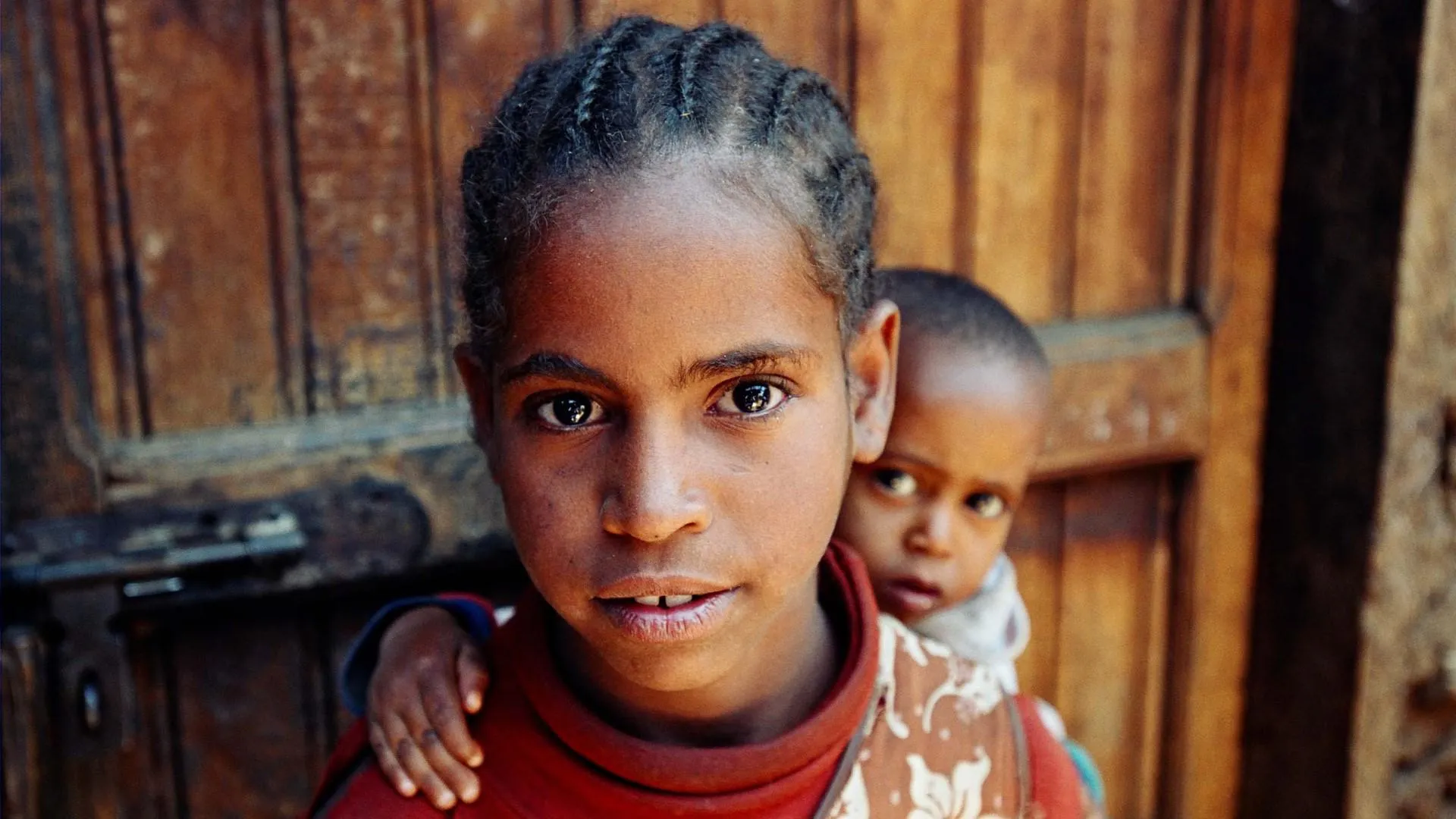
Addis Ababa, Ethiopia: this young girl is working long hours for a family as a maid, and taking care of her employers' children but receiving no salary. Photo (c) Marcel Crozet / International Labour Organization.
Identifying existing legal frameworks to close an ‘accountability gap’ around State involvement
In 2017, Professor Philippa Webb and Dr Rosana Garciandia began work on a British Academy-funded project, State responsibility for modern slavery: uncovering and bridging the gap.
Professor Webb and Dr Garciandia had, through conversations with colleagues at the United Nations University, identified an accountability gap: as a result of legislation like the Modern Slavery Act there had been real progress in addressing the problem in relation to private sector businesses and their supply chains; there were also controls in place to tackle trafficking and exploitation by criminals and criminal groups; but the involvement of States themselves was rarely discussed.
People were saying to us, ‘This is the bit States don't want to talk about. They're very comfortable saying we've got to target corporations or gangsters, but if you say, ‘Look at the cotton industry run on forced labour in this country’, or, ‘Look at how the recruitment agencies in this country are contributing to domestic servitude in another jurisdiction,’ some States became less interested. So that was the gap that we saw.
Professor Philippa Webb, Professor of Public International Law
Webb and Garciandia’s focus was not on developing new laws or treaties, but on explaining in practical ways the existing legal frameworks and the tools, some of which have been available for 100 years.
Their analysis indicated “that certain practices and policies of some States could amount to a breach of the prohibition of slavery, forced labour and human trafficking and constitute an internationally wrongful act… The conduct of State officials, bodies or agencies may also involve the State in a modern slavery situation. Even non-State entities exercising public powers… could compromise the State if they engage in an activity tainted by modern slavery.”
This was not a topic that was generally covered in the analysis of modern slavery and the very remote references you would find were generally to corrupt officials facilitating or engaging in modern slavery practices: the focus wasn’t on the State, but on how the State would deal with those few ‘bad apples’. From there we shifted towards a narrative where State involvement in modern slavery is more broadly accepted as part of the problem. States do have obligations to control what private individuals or organizations are doing, but they also have obligations to not create or facilitate situations of modern slavery through their policies, including through the funding of projects abroad.
Dr Rosana Garciandia, Lecturer in Public International Law
Webb and Garciandia identified five scenarios where States might bear responsibility for modern slavery and, based on evidence of State involvement, produced a series of legal policy recommendations, looking at existing frameworks that “indicate new avenues for accountability, better protection of victims and more effective work towards the achievement of Sustainable Development Goal 8.7.”
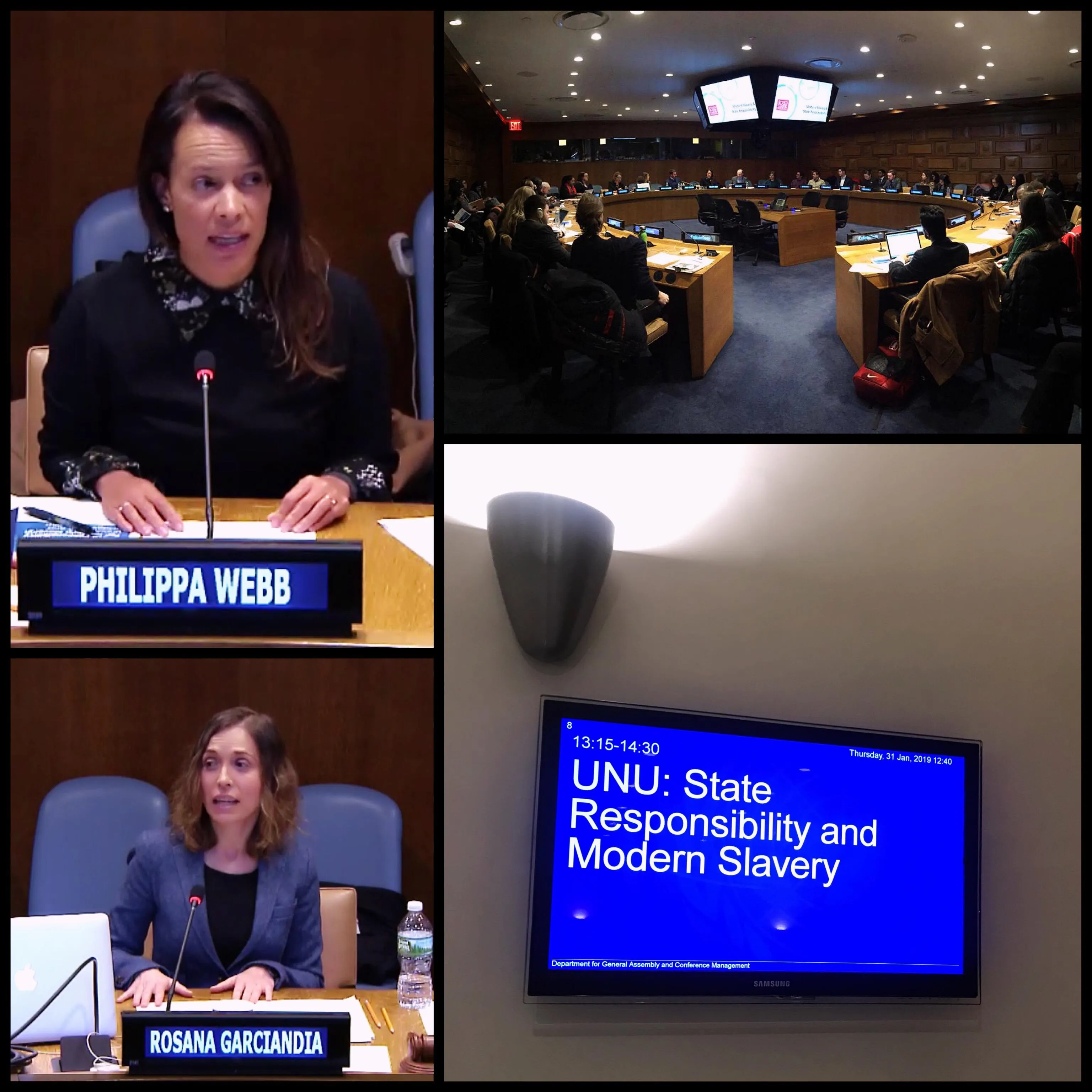
They launched their legal policy recommendations at the United Nations Headquarters in New York to representatives of States, international organisations and civil society organisations.
Their work was welcomed by Urmila Bhoola, the UN Special Rapporteur on contemporary forms of slavery, who made reference to it in her final report to the UN Human Rights Council and has credited Webb and Garciandia with providing “a new dimension to the dialogue of key stakeholders on contemporary forms of slavery”. Their third recommendation, which focused on the alleged involvement of diplomats in modern slavery, has been a key element in a legal case currently before the UK Supreme Court, which could have wide-ranging implications.
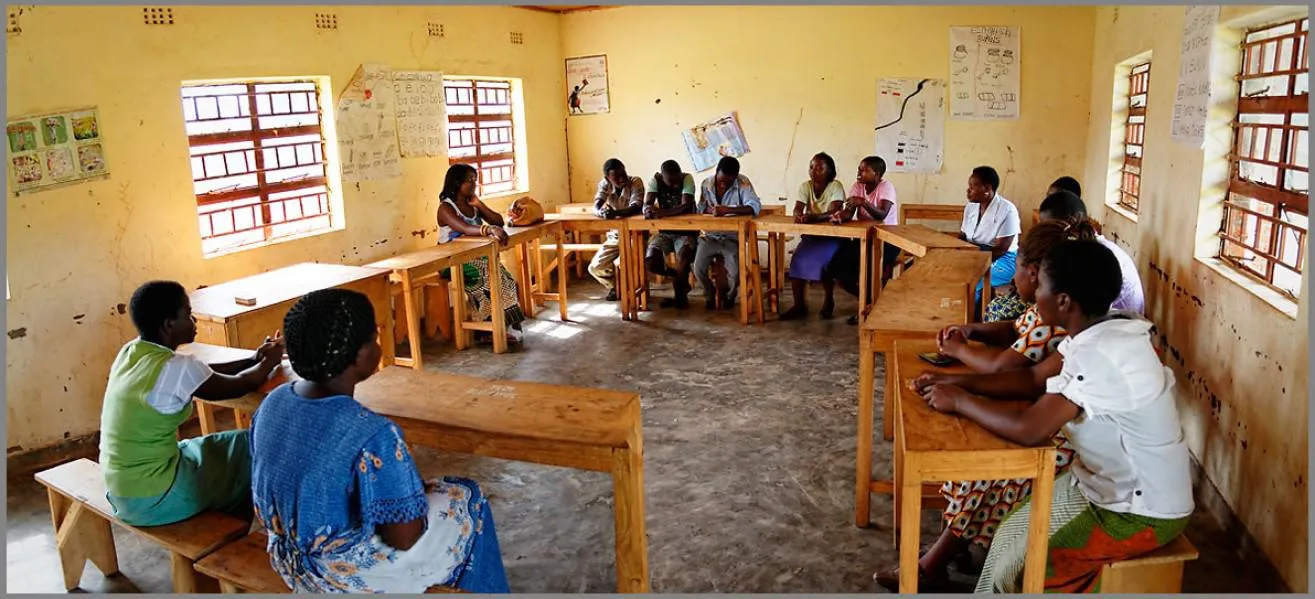
Lilongwe, Malawi: The Domestic Workers Forum also provides a safe place where domestic child workers can talk about their working conditions. Photo (c) and by kind permission of the International Labour Organization.
Elaborating a development approach to human trafficking and modern slavery
Professor Prabha Kotiswaran has been writing about anti-trafficking law and policy in the UK and India for over 15 years.
For her 2017 edited collection, Revisiting the Law and Governance of Trafficking, Forced Labor and Modern Slavery, Professor Kotiswaran brought together global experts to review the Transnational Legal Order (TLO) on trafficking.
The United Nations Protocol to Prevent, Suppress and Punish Trafficking in Persons, Especially Women and Children requires three criteria to be fulfilled for a person to classed as trafficked, yet two of these criteria – coercion and exploitation – are, Professor Kotiswaran argues, poorly defined. The failure to clearly define these terms, in the context of the complex dynamics shaping global migration, has resulted in an inconsistent approach, and an overall failure of enforcement.
Additionally, the focus within the TLO on trafficking for sex work; the assumptions made regarding coercion and exploitation in this area and about the informal economy more generally; and the tendency to ignore the role of immigration controls in enabling trafficking, demonstrate biases which undermine attempts to properly address both trafficking and exploitation more generally.
With the dominant criminal law approach to trafficking faltering, over the past decade a victim-centred, human rights approach has developed in response. While the human rights approach has succeeded in softening the impact on victims in a limited number of cases, States continue to favour criminalisation and the repatriation of those found to have been trafficked. A third strand, the labour approach, has merit but, Kotiswaran argues, suffers from its focus on labour law hatched in the industrialised countries of the Global North, with little reference to the diverse economies of many of the regions that have become the focus for those working on trafficking.
In this collection and in her article Trafficking: A Development Approach (2019), Kotiswaran proposed instead a development approach, rejecting a “one size fits all” solution in favour of a flexible approach which takes account of the diverse economies of the Global South, where informal work dominates. Using the example of India, she argued that conventional regulatory responses to trafficking and modern slavery must be fundamentally rethought. An uncritical reliance on a criminal law approach to trafficking must be replaced by efforts to implement domestic labour and social welfare laws that are themselves the result of long-term struggles by workers’ movements for decent work and against extreme exploitation.
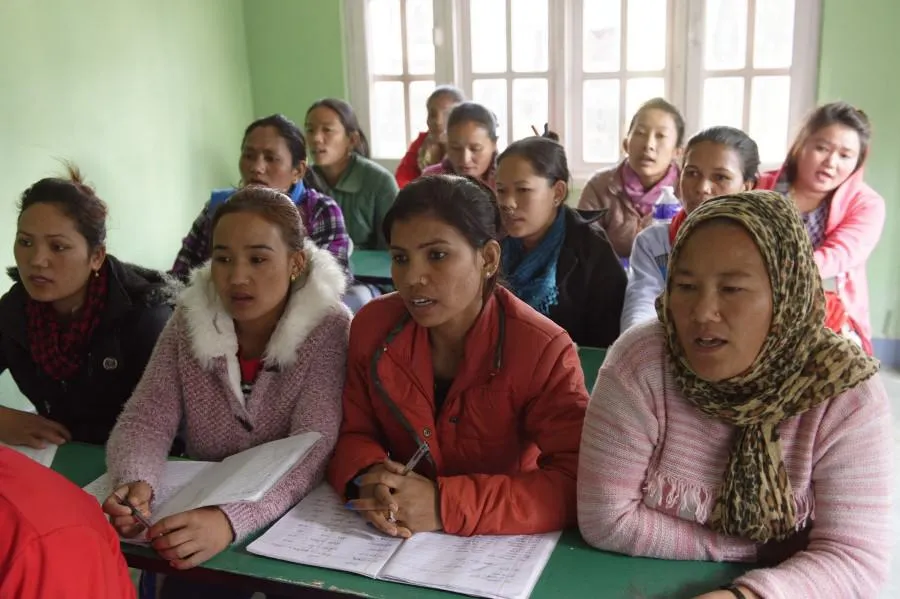
NEPAL: Women attend an International Labour Organization project aimed at ensuring they know their rights and don't fall into forced labour. Photo (c) Marcel Crozet; by kind permission of the International Labour Organization.
In India, Professor Kotiswaran’s scholarship and advocacy informed the policy debate around the Trafficking of Persons (Prevention, Protection and Prosecution) Bill 2016 and 2018. The Bill, she argued, contained provisions that could further harm vulnerable individuals. She called on Parliament to “fundamentally rethink the Bill to produce a well-drafted, rights-positive legislation that positions India at the forefront of the quest to achieve Sustainable Development Goal 8.7 by ending forced labour, modern slavery, human trafficking and the worst forms of child labour.” Her advocacy efforts won support from two UN Special Rapporteurs and were credited by one MP with playing “an instrumental role” in the formulation of their own approach.
The impact of Professor Kotiswaran’s research has been recognised internationally. Since 2013, Kotiswaran has been a member of the advisory board of the International Labour Organisation’s Work in Freedom Programme, which aims to reduce vulnerability to trafficking and forced labour for women undertaking garment and domestic work in Bangladesh, India, Jordan, Kuwait, Lebanon and Nepal. Kotiswaran’s research has prompted the Programme to move away from criminal justice approaches towards a labour law and development approach to trafficking.
Thumbnail image: Dover, UK, November 2021: Migrants sit inside a bus as they wait transportation after arrival. Britain renewed an offer to send police and border forces to France to carry out joint patrols along the Channel coast after at least 27 migrants drowned in an attempted crossing. (Photo by BEN STANSALL/AFP via Getty Images)







